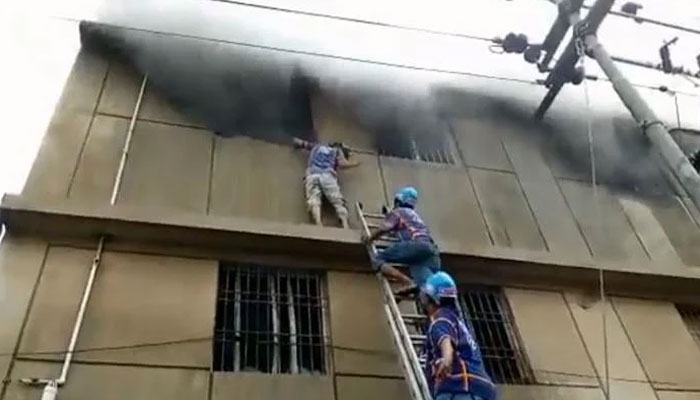Protecting workers and protecting lives
Through the implementation of occupational health and safety laws and standards, the safety and security of workers can be ensured
September 08, 2021

Another factory inferno in Karachi killed 17 workers. Most of them lost their lives as they failed to escape the deadly fire due to a locked exit – meaning the workers had no emergency exit.
How tragic is it that 17 bread earners of their families have lost their lives just because the occupational health and safety laws and regulations were not properly implemented. Nothing really has changed in the last nine years since the Baldia factory tragedy.
This horrific incident is another example of how working people and families pay the ultimate price for the criminal negligence of government officials and the capitalist lust for more profits. The government must take immediate steps to improve workers’ health and safety and upgrade the health and safety regulations.
Our failure to learn lessons from the Baldia factory fire in 2012 has led us to this tragedy. The authorities handled the Baldia factory case politically and deliberately overlooked the issue of occupational health, safety and working conditions.
The criminal negligence of government departments has caused these deaths. Equally responsible is the lust of the owner of the factory for maximum profits and ignoring the basic safety measures at the factory. The FIR registered by the police in this gruesome incident is a clear charge sheet against relevant government departments and the factory owner.
As part of the neoliberal pro-market agenda, labour inspections were curtailed in the last 30 years and capitalist enterprises and industries have been given a free hand to exploit the working people. Working conditions in most of the medium and small industries are deteriorating without any check, and the majority of Pakistani workers are forced to work in slave-like conditions. Many industries are not only working in residential areas but also without having any permissions and registration.
In this case, the FIR also stated that there was no alarm system in the factory either. The building was constructed in such a way that no one could get out in an emergency. The factory was reportedly built illegally and working without registration with the labour department.
It is obvious that business-as-usual continues even after the killing of 256 factory workers in an inferno eight years ago. No real measures and policy decisions were taken to stop another such factory tragedy from occurring.
Through the implementation of occupational health and safety laws and standards, the safety and security of workers can be ensured, and risks reduced. We have two big problems in providing a safe working environment at workplaces. One problem is the outdated occupational health and safety laws and rules. We haven't updated our laws according to the fast-changing working environment. Our laws are inadequate and outdated and need to update in accordance with the use of modern technology.
The second issue is the non-implementation of existing laws. We have some good labour laws that protect labour rights, but we hardly implement these laws. Two important components are missing in the implementation of laws. Both the federal and provincial governments are not interested in implementing the labour laws in letter and spirit to protect workers from capitalist exploitation.
The second factor is the weakness of the labour movement. A strong, well organised and vibrant trade union movement is necessary to ensure the implementation of labour and safety laws. The trade union movement is not in a position to exert enough pressure on the government and the ruling class to implement the labour laws that protect worker’s rights.
Unfortunately, the neoliberal onslaught of the last four decades and structure changes in capitalist production and technology have significantly weakened the labour movement, which has been on the decline since the 1990s. The privatisation of state-owned industries and enterprises; closure of old traditional industries, liberalisation of the economy and market reforms also played their role in the decline of the labour movement in Pakistan.
Every military dictator targeted organised working-class movements and introduced repressive laws and policies. The depoliticisation of trade union movements replaced the ideological trade union activists and leaders with opportunism and corruption. The majority of the union leaders became corrupt and joined hands with the bureaucracy to enrich themselves at the expense of the working class.
Although Pakistan’s constitution and laws allow the formation of trade unions at most workplaces and industries, in reality, it is an uphill task to form a union in the private sector. In many industries, trade unions do exist but they are not genuine workers unions. Yellow or pocket unions have sprung up in the last three decades.
That is why only 1% of workers are unionised in Pakistan. Only 5% of workers are registered with social security and pension institutions and only 3% of workers received written appointment letters.
Collective bargaining rights have been severely curtailed. More than 75% of the workforce is working in the informal sector. Every year, more jobs are created in the informal sector than the formal sector.
Pakistan has ratified more than 38 International Labour Organisation (ILO) conventions, but there is hardly any implementation of these conventions.
Originally published in The News











